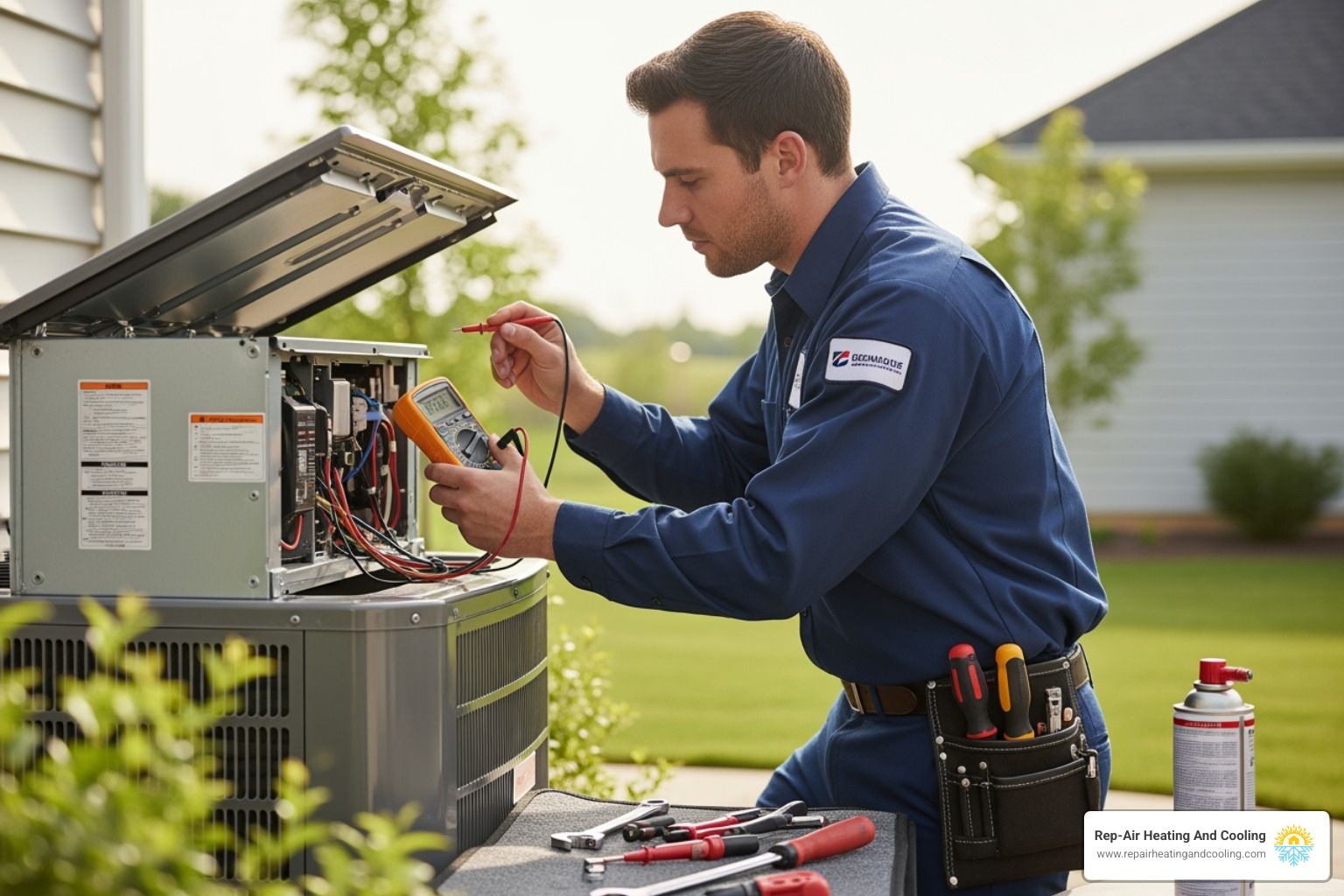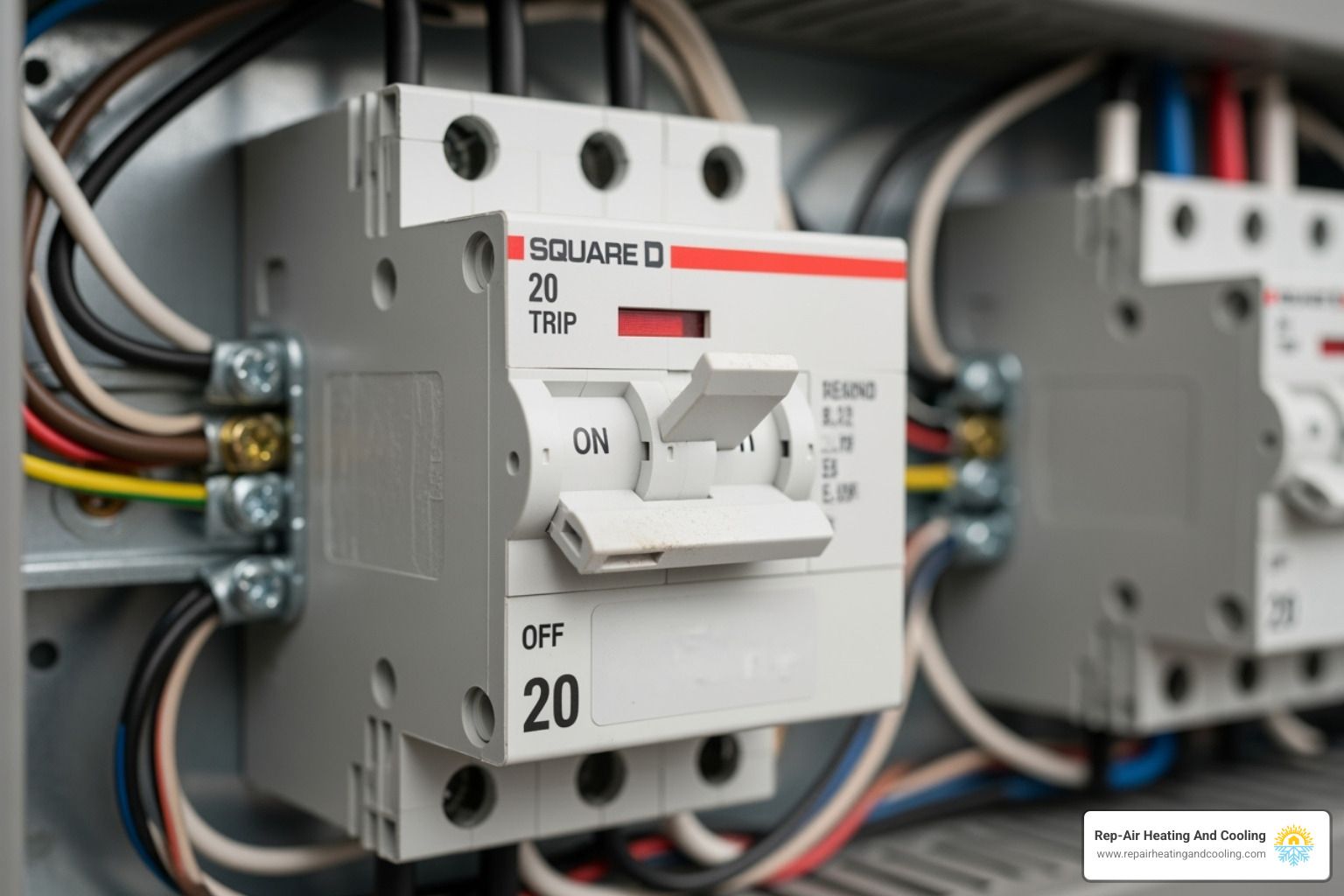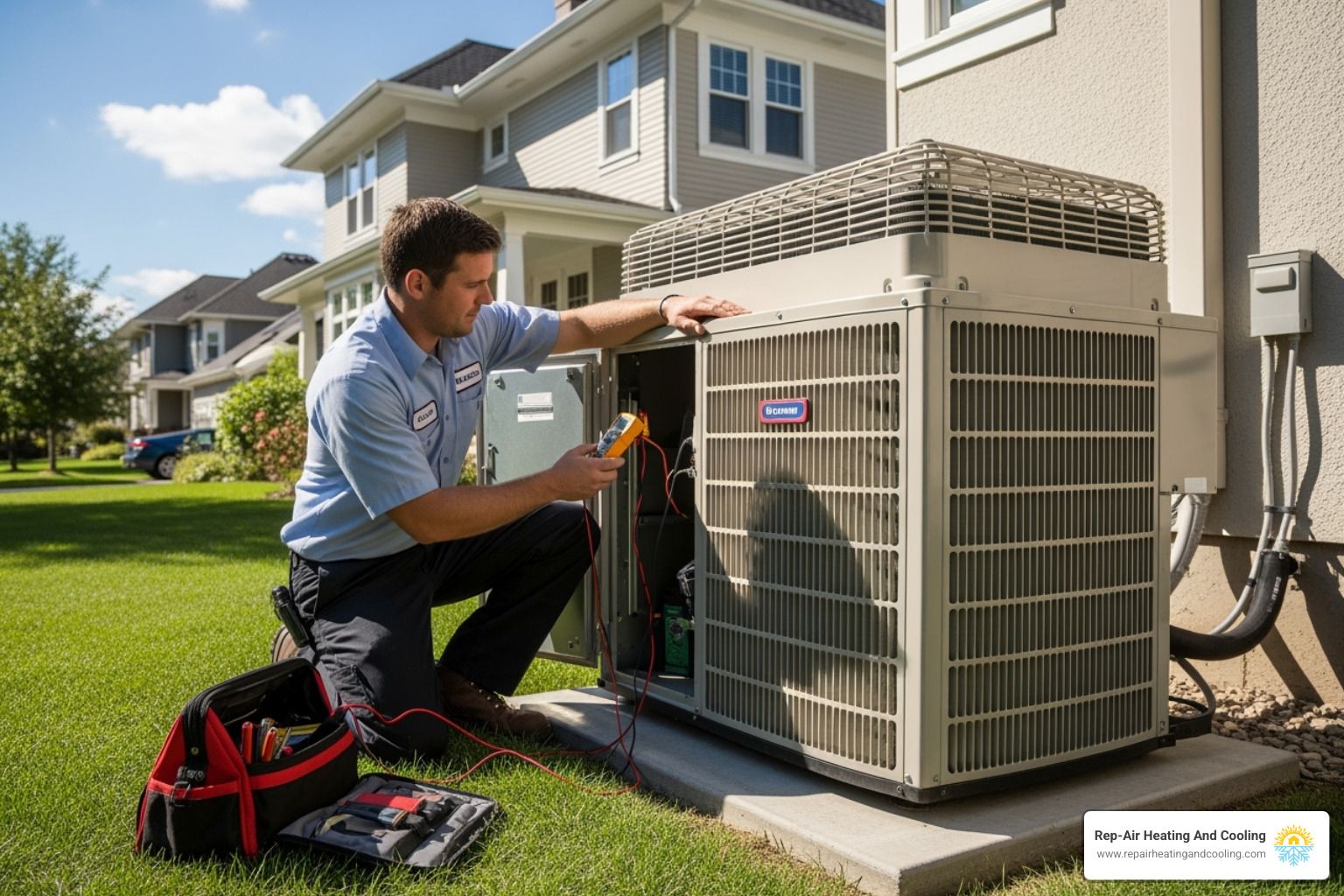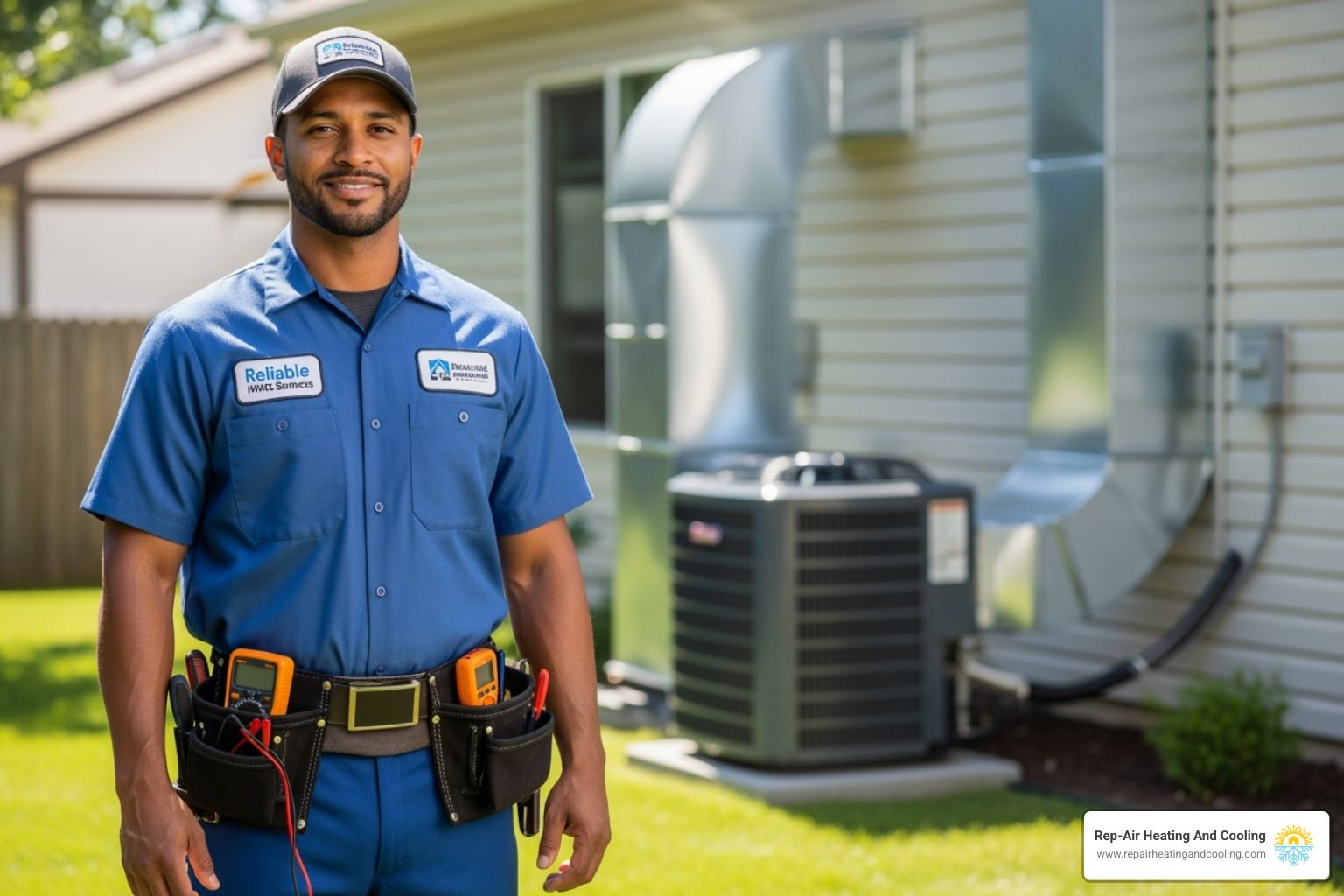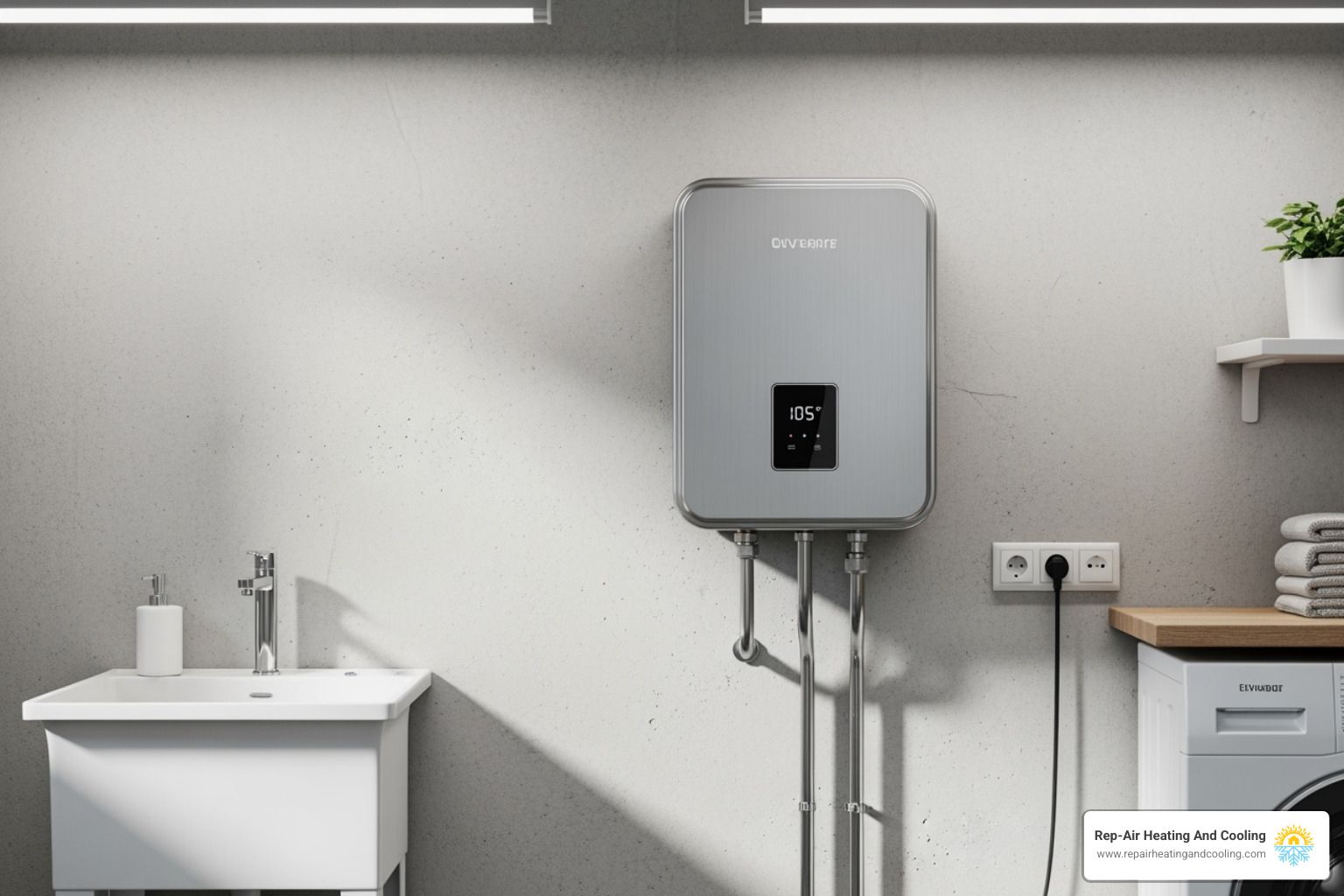The Path to AC Certification: What You Need to Know
IMPORTANT NOTE: . Our company is located in British Columbia, Canada. If you are reading this article in another location, we hope you enjoy the information, but unfortunately we cannot service you.

Table of Contents
ToggleWhy Hiring a Certified AC Technician Protects Your Home
A Certified AC technician is a professional who has completed rigorous training, passed government-regulated exams, and holds valid licenses to safely install, repair, and maintain air conditioning systems in your home.
Key qualifications of a certified AC technician:
- Refrigeration and Air Conditioning Systems Mechanic (313A or 313D) certification
- Gas Technician license (G2 or G1) for integrated HVAC systems
- Red Seal endorsement demonstrating national standards
- TSSA (Technical Standards and Safety Authority) compliance
- Ongoing professional development to stay current with codes and technology
When your AC breaks down on the hottest day of summer, you want someone who knows exactly what they’re doing. A certified technician brings more than just tools to your home – they bring years of apprenticeship training, deep knowledge of safety protocols, and the expertise to diagnose complex problems correctly the first time.
The difference between a certified professional and an unlicensed handyman can mean the difference between a safe, efficient repair and a dangerous situation that puts your family at risk. Certified technicians understand electrical systems, handle refrigerants safely, and follow strict building codes that protect your home’s warranty and your family’s safety.
In Ontario, becoming a certified AC technician requires completing thousands of hours of hands-on training and passing rigorous exams with scores of 70% or higher. This isn’t just about fixing what’s broken – it’s about ensuring your entire HVAC system works safely and efficiently for years to come.
What “Certified” Really Means for Your AC Service
When you see “Certified AC technician” on our business card, it’s not just marketing fluff. It means our team has jumped through some serious hoops to earn that title – and those hoops exist to protect you and your family.
Think of certification like a driver’s license, but way more complicated. Our technicians have completed government-regulated training programs that would make your head spin. They’ve studied electrical systems, mastered refrigerant handling, and learned safety protocols that keep your home safe from gas leaks and electrical fires.
Technical Standards and Safety Authority (TSSA) and Skilled Trades Ontario don’t mess around when it comes to setting standards. These regulatory bodies make sure every certified technician knows their stuff inside and out. When we show up at your door, we’re not just bringing tools – we’re bringing knowledge that meets strict government standards.
Our commitment doesn’t stop after we get certified either. The HVAC world keeps evolving, and so do we. New technologies, updated building codes, and improved safety protocols mean we’re always learning. It’s like continuing education, but for keeping your family comfortable and safe.
Many of our certifications are part of The national standard for trades in Canada, which means the expertise we bring to your Mission home meets the same high standards you’d find anywhere across the country.
The Mark of a True Professional
Becoming a Certified AC technician isn’t something you can do over a weekend workshop. We’re talking about in-depth apprenticeships that take years to complete – literally thousands of hours of hands-on experience combined with serious classroom time.
A Refrigeration and Air Conditioning Systems Mechanic needs over 8,000 hours of on-the-job training plus 720 hours in the classroom. That’s roughly five years of your life dedicated to mastering this trade. Even the residential-focused certification requires more than 4,000 work hours and hundreds of classroom hours.
Then comes the fun part – passing proctored exams where you need at least 70% to earn your Certificate of Qualification. These aren’t multiple-choice tests you can wing. They cover everything from mechanical cooling cycles to electrical fundamentals, and they separate the serious professionals from the wannabes.
This rigorous process is exactly Why it’s Worth Hiring Qualified HVAC Technicians. When your AC dies during a heat wave, you want someone who’s put in the time and commitment to the trade, not someone who watched a few YouTube videos.
Beyond the Paper: Essential Skills for Success
Certification papers look nice on the wall, but what really matters is what our Certified AC technician brings to your home. Problem-solving skills top the list – because every AC problem is like a puzzle, and some pieces are pretty well hidden.
Our technicians need rock-solid electrical knowledge to steer the complex wiring in modern HVAC systems. Refrigerant handling requires precision and safety awareness – this stuff can be dangerous in the wrong hands. Mechanical aptitude helps them understand how all the moving parts work together to keep you cool.
But here’s what might surprise you: attention to detail and customer communication are just as important as the technical stuff. A loose wire connection or a miscalibrated thermostat can cause big problems down the road. And if we can’t explain what’s wrong in plain English, we’re not doing our job right.
We believe in treating you like family, which means being honest about what’s happening with your system and what it’ll take to fix it. When you Choose Professional HVAC Services, you’re getting someone who combines technical expertise with genuine care for your comfort and safety.
Why a Certified AC Technician is Essential for Your Home
When the summer sun is shining bright in the Lower Mainland, your home’s air conditioning system isn’t just a luxury – it’s a true necessity for staying comfortable. It’s also a big investment! So, making sure it works perfectly is super important for your family’s comfort and safety. That’s why hiring a Certified AC technician isn’t just a good idea; it’s absolutely essential. It helps keep your system running smoothly, protects your home, and most importantly, keeps your loved ones safe.
Think of a certified technician as a detective for your AC. They use special tools to find problems exactly, right down to the source. This means no guesswork and no wasted money on “trial-and-error” fixes. Because they really know their stuff about system efficiency, your AC will run just right, saving you money on those energy bills over time. We even have comprehensive maintenance plans to keep your system in tip-top shape, making it last longer and work better for years to come.
Now, imagine someone who isn’t properly trained trying to fix your AC. It could lead to little problems getting worse, or even big dangers like carbon monoxide leaks or electrical fires. That’s why we truly believe you should Avoid DIY HVAC for Your Own Good: Here Are 3 Reasons Our Professional Technicians Are Telling You to Hire Us and Skip the DIY Fixes. Your peace of mind and your family’s safety are always worth it.
Protecting Your Investment and Warranty
One of the biggest reasons to call a Certified AC technician is to protect that valuable warranty on your HVAC system. Many manufacturers say that only certified pros can install, maintain, or fix your unit. If someone who isn’t certified messes with your AC, it can actually void your warranty! That means you could be stuck paying for expensive repairs yourself, even if it was the manufacturer’s fault.
Our certified technicians make sure everything is installed just right, following all the manufacturer’s rules and local building codes. We also use only the correct, approved parts when we do repairs. This careful way of working, as you can see in our Professional HVAC Installation Steps, doesn’t just protect your warranty. It also helps your equipment last as long as possible, giving you many years of cool, comfortable living.
Ensuring Safety with Gas and Electrical Systems
Many AC systems work hand-in-hand with your home’s furnace. This often means dealing with both tricky electrical wiring and, for gas furnaces, natural gas lines. These are serious components, and they’re definitely not for amateurs! A Certified AC technician has special training to handle these potentially dangerous parts safely and correctly.
For example, knowing how electrical systems work is super important to prevent shocks, dangerous short circuits, or even fires. And when it comes to gas lines, a special Gas Technician license (we’ll dive into this more later!) is a must. This ensures there are no leaks that could lead to something as serious as carbon monoxide poisoning or an explosion. Our technicians are highly trained to spot and fix these risks, putting your family’s safety above everything else.
Sometimes, Common AC Repair Issues & Solutions might seem simple on the surface. But underneath, there’s a whole world of complex connections between electrical, mechanical, and gas parts. Only a certified professional can safely and correctly take care of these things, giving you true peace of mind.
Understanding Key AC Technician Certifications
Navigating HVAC certifications can seem a bit like decoding a secret language, but for homeowners, understanding these distinctions is key to ensuring you’re hiring the right professional for the job. In Ontario, HVAC work falls under “compulsory trades,” meaning individuals must hold specific certifications to legally perform the work. This ensures a baseline of competency and safety. Different certifications signify different levels of expertise and scope of work, ranging from residential systems to large-scale commercial and industrial setups.
The Red Seal Program, as mentioned, is a national standard that ensures consistency across Canada. When a technician holds a Red Seal endorsement, it means their skills and knowledge have been assessed and recognized as meeting a national standard of excellence. It’s a strong indicator of a highly qualified professional.
What to Look for in a Certified AC Technician
When you’re looking for someone to service your home’s AC, you’ll primarily encounter two main types of AC technician certifications, along with the crucial Gas Fitter license:
| Certification Name | Focus Area | What it Means for Your Home |
|---|---|---|
| Residential Air Conditioning Systems Mechanic (313D) | Residential AC systems, including geo-exchange | This technician is specifically trained and certified to install, service, and repair the air conditioning systems typically found in homes. If you have a standard residential AC unit or a geo-exchange system in your house, a 313D certified technician is perfectly qualified to help you. |
| Refrigeration and Air Conditioning Systems Mechanic (313A) | Commercial, industrial, and residential refrigeration, cooling, and combined heating-cooling systems | This is a broader, more comprehensive certification. A 313A technician can work on all systems a 313D can, plus larger, more complex commercial and industrial units. While they are fully qualified for residential work, their training covers a wider range of systems. If your home has a very complex or unique HVAC setup, a 313A might bring an even deeper level of expertise. |
| Gas Fitter (G2/G1) | Installation, maintenance, and repair of natural gas or propane-fired equipment | This license is absolutely critical for any technician working on your furnace or any other gas-fired appliance in your home, which often integrates with your AC system. A G2 license allows them to work on most residential and light commercial gas appliances, while a G1 is for all types of gas equipment. Without this, a technician cannot legally or safely work on your gas furnace. |
For most homeowners, a Certified AC technician holding a 313D license, coupled with a G2 Gas Fitter license, is precisely what you need for your residential AC and furnace work. The Red Seal Endorsement on a 313A license is an additional mark of excellence, indicating a technician who meets Canada’s highest standards. We ensure our technicians carry the appropriate certifications for every job, guaranteeing peace of mind for our customers in Mission and across the Lower Mainland.
Why a Gas Technician License is Crucial for a Certified AC Technician
It might seem odd that an AC technician needs a “Gas Technician” license, but for homeowners, it’s incredibly important. Many home comfort systems are integrated. Your air conditioner cools your home, but it often shares ductwork and controls with your furnace, which typically runs on natural gas. This integration means that technicians frequently need to work on both parts of the system.
A Gas Technician license (like a G2 or G1) permits a technician to legally and safely install, maintain, and repair natural gas or propane-fired equipment, including your furnace. This is regulated by the TSSA to prevent gas leaks, carbon monoxide hazards, and other serious safety issues.
Without this license, a technician cannot legally touch your gas furnace, even if it’s just to check the airflow related to your AC. This is why our Certified AC technician team is cross-trained and properly licensed, ensuring they can handle your entire HVAC system safely and comprehensively. It’s part of our commitment to your home’s safety and comfort, and crucial for you to How to Make Sure the HVAC Company You Choose Will Be Reliable.
Common Problems Only a Certified Technician Should Handle
When your AC starts acting up, it’s tempting to grab your toolbox and try to fix things yourself. We get it – you’re handy around the house, and YouTube makes everything look simple. But here’s the thing: some AC problems are like icebergs. What you see on the surface is just a small part of a much bigger, more complex issue underneath.
Take that ice buildup on your AC coils in the image above. It might look like a simple frozen pipe situation, but it could signal anything from a refrigerant leak to electrical failures or even compressor issues. These aren’t problems you can solve with a hairdryer and good intentions.
Strange noises coming from your unit? That grinding, squealing, or banging could mean worn bearings, loose components, or motor problems. Poor airflow might seem like a dirty filter issue, but it could actually be ductwork problems, blower motor failure, or even thermostat malfunctions.
When your AC Unit is Leaking Indoors, you’re looking at potential water damage to your home, plus the underlying cause could be anything from a clogged drain to refrigerant issues. These situations call for a Certified AC technician who can get to the root of the problem safely and effectively.
Diagnosing Complex Electrical and Refrigerant Issues
Let’s talk about the two big areas where DIY repairs can go from “oops” to “oh no” really quickly: electrical problems and refrigerant handling.
Your AC system is packed with electrical components that would make an electrician’s head spin. Circuit boards, capacitors, contactors, and complex wiring systems all work together in a delicate dance. When something goes wrong, a Certified AC technician uses specialized diagnostic tools to read the electrical signatures and pinpoint exactly what’s failing.
Trying to diagnose electrical issues without proper training and equipment is like trying to perform surgery with a butter knife. You might get lucky, but you’re more likely to cause serious damage – or worse, hurt yourself. Understanding wiring diagrams and pinpointing root causes requires years of training and experience that certified technicians bring to every job.
Then there’s refrigerant – the lifeblood of your cooling system. This isn’t just any liquid; it’s a carefully balanced chemical system regulated by EPA regulations. Refrigerants are potent greenhouse gases, and handling them improperly isn’t just dangerous for you – it’s illegal and harmful to the environment.
A certified technician has the proper equipment to detect leaks, safely recover refrigerant, repair the problem, and recharge your system to exact specifications. They know When to Use an HVAC Professional, and refrigerant issues are definitely one of those times.
The Importance of 24/7 Emergency Service
Murphy’s Law seems to have a special fondness for air conditioners – they always break down at the worst possible moment. It’s never a mild Tuesday in April; it’s always the hottest day of summer, usually on a weekend or holiday.
That’s when having access to a Certified AC technician with 24/7 emergency service becomes absolutely crucial. When your AC gives up during a Lower Mainland heat wave, waiting until Monday morning isn’t just uncomfortable – it can be dangerous for elderly family members, young children, or anyone with health conditions.
Unexpected breakdowns during heatwaves require quick response and expert diagnosis. Our emergency technicians arrive equipped to handle after-hours repairs efficiently, whether it’s a failed compressor, electrical failure, or any other critical issue that’s stealing your comfort.
The peace of mind that comes with knowing help is just a phone call away, any time of day or night, is invaluable. That’s one of the 3 Benefits of Having an HVAC 24/7 Professional – restoring comfort when you need it most, not when it’s convenient for everyone else.
Conclusion
When your AC breaks down on the hottest day of summer, you’ll be grateful you chose a Certified AC technician who knows exactly how to get your system running safely and efficiently. Throughout this guide, we’ve explored how certification isn’t just a piece of paper – it’s your guarantee of technical expertise, rigorous training, and unwavering commitment to safety protocols that protect both your family and your investment.
The difference between a certified professional and someone who simply claims to know HVAC work can’t be overstated. Quality workmanship comes from years of apprenticeship training, thousands of hours of hands-on experience, and passing those challenging government-regulated exams. When you understand what 313D and 313A certifications really mean, or why that Gas Technician license is absolutely crucial for integrated HVAC systems, you’re making an informed choice that prioritizes your home’s safety.
Long-term value is what you get when complex electrical issues are diagnosed correctly the first time, when refrigerant problems are handled according to EPA regulations, and when your warranty stays intact because the work was done right. These aren’t just repairs – they’re investments in your family’s comfort and peace of mind.
At Rep-Air Heating And Cooling, our team of fully certified professionals treats every customer like family because we understand that your home is your sanctuary. Whether you need routine maintenance, emergency repairs, or help with those tricky integrated systems that require both AC and gas expertise, we bring the certifications and experience that matter.
For expert AC services in Mission and the Lower Mainland, trust our certified technicians to get the job done right. When it comes to your family’s comfort and safety, settling for anything less than certified expertise simply isn’t worth the risk.
Request your service today!
Our team of highly trained technicians are standing by ready to help you out with all of your service, repair, and installation needs. You can count on us for on-time repairs, professional installation, and the friendliest customer service in town!Contact Rep-Air Heating & Cooling today to get started with service by requesting a quote online, or by phone at (844) 218-3362.
Request Service
Contact us today to request an estimate or schedule service.




